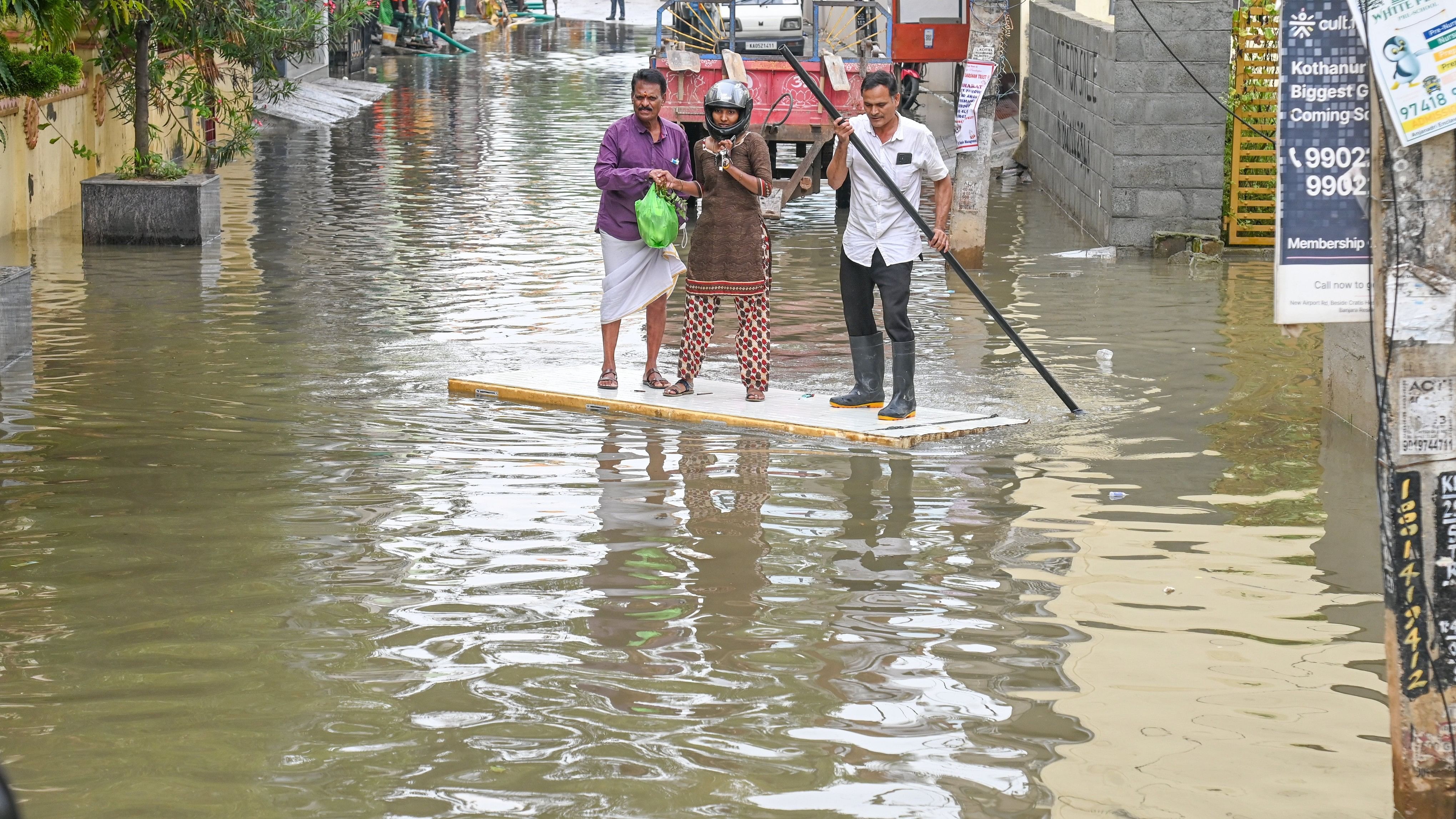
During the recent rains in the city, residents of Sri Sai Layout were forced to use a door as a makeshift boat to get from one point to the next.
Credit: DH File Photo
Bengaluru: Extreme rainfall and fluctuating weather, exacerbated by Bengaluru's infrastructure problems, have caused unique social and health impacts, experts and activists say.
The 2024 Report of the Lancet Countdown released on November 9 paints a stark picture of global health impacts due to climate change like increased extreme precipitation events, drought, and spread of vector-borne diseases.
Prafulla Saligram, secretary of the Society for Community Health Awareness Research and Action (SOCHARA), says extreme weather events due to climate change and the rampant, unscientific and exponential growth of Bengaluru have inflated the climate crisis.
"The rampant infrastructure expansion has actually shifted the geology of the city. The higher you want to build, the more you have to dig, impacting or loosening shallow aquifers which provide sink and sponge effect to rainwater. For example, the flyover in Hebbal has fragmented the Hebbal Lake into Nagavara Lake and Hebbal Lake. On Hebbal Lake, buildings after buildings are coming up,” she opined.
She continued: "Instead of looking at alleviating impacts of climate change, we must also look to mitigate or adapt. We seem to be only seeing unidirectional development and paying a heavy price for that. The most vulnerable will be the urban and poor, underprivileged, deprived communities."
Pushkara S V, senior consultant, Indian Institute for Human Settlements, said: "The major contributors to pollution are vehicles, industrial emissions and construction. However, gaps in solid waste management also contribute significantly towards greenhouse gas emissions that lead to climate change. Bengaluru generates about 6,000 tonnes of solid waste every day. But the city currently processes only 1,000-1,500 tonnes per day. All the unprocessed waste is disposed of in landfills quarries. From these landfill quarries, methane gas, which is a potent greenhouse gas, is emitted into the atmosphere."
Due to inefficient solid waste management systems and lack of monitoring, burning of solid waste also contributes to the increasing pollution, he noted.
Sufia Sadaf, programme manager, Outreach and Science Communication, NCBS, said that due to fluctuating weather and climatic conditions, there was an increase in vector-borne diseases like the ones spread by mosquitoes.
"These vector-borne agents love humidity and increasing temperatures. They also have prolonged breeding durations and increased breeding areas due to increased floods and clogging. The more the virus incubates in an infected and sickly body, the more it mutates because that's what they are best designed to do,” she added.
She also mentioned that hot and humid weather is favourable to other pathogens like cholera.
Vegetarianism & veganism
Public health expert Dr Sylvia Karpagam pointed out that by promoting vegetarianism and veganism, the burden of climate change has been shifted to the most vulnerable groups that contribute least to greenhouse emissions.
"An increasing number of dominant-caste health experts pushing for vegetarianism comes from a place of privilege. The vegetarianism of the rich is very different from the food habits of the poor. The burden of climate change is now being pushed upon the poorest of the poor, in the form of vegetarianism," she noted and added that India’s poor hardly eat anything, let alone a vegan diet.
She highlighted that "cruelty-free" products like almond milk come with monocropping, which cause climate adversities.